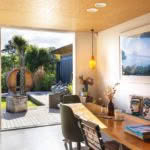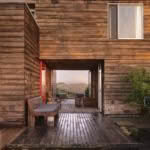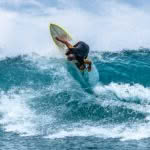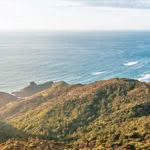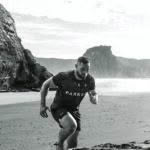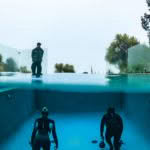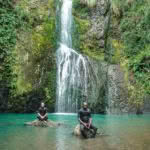The man behind Piha workshops bringing athletes to peak performance
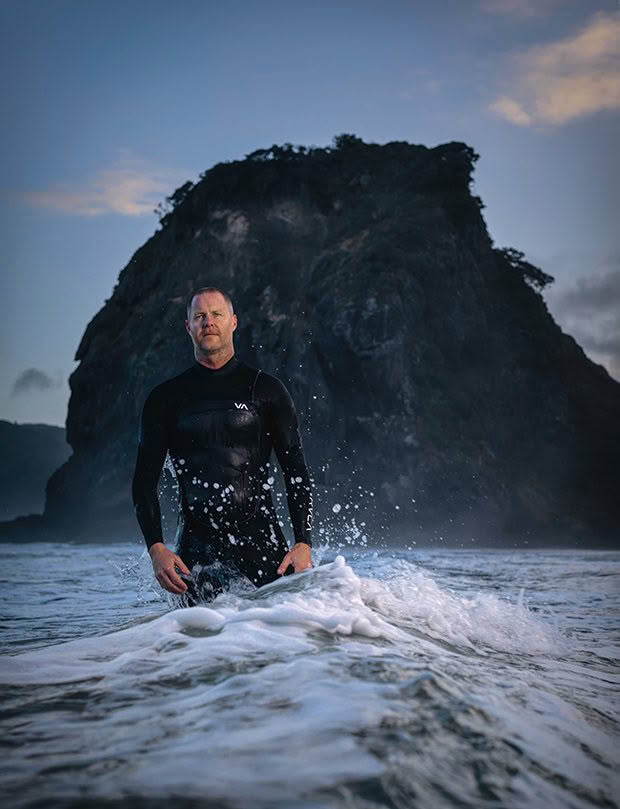
Born and bred in Piha, human performance specialist Dave Wood has saltwater in his veins. Late afternoon is his favourite time of day to surf. “It’s incredible being in the water and watching the sunset.”
A strong sense of place gives mind-body coach Dave Wood a grounded foundation.
Words: Claire McCall Photos: Tessa Chrisp
A storm in the Waitākeres is a primaeval thing — in the south Piha house that Dave Wood and Emma Shand have owned for 11 years, high on a ridge where the wind channels up the valley, sometimes the windows shake. The bush, seen through a glazed frame in the snug, becomes animate. The awesome force of nature is writ large. For Dave, whose grandparents were among the area’s original residents, the thrill of the squall is felt viscerally. His calling is not to run from it but towards it.
Childhood days spent surfing with mates may sound like fun and freedom, yet there was also a frisson of fear, a constant undercurrent of dreadful excitement.
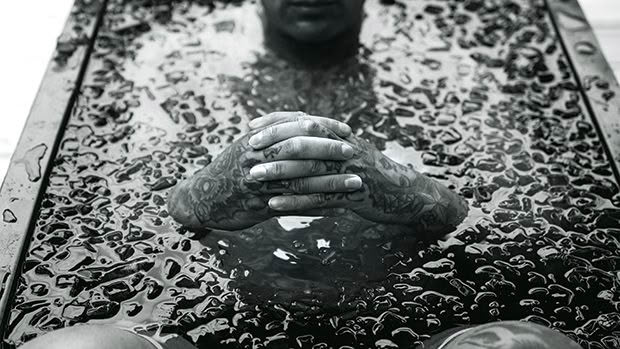
Ice bathing forms part of Dave Wood’s Calm Under Pressure workshops.
“It was a group of guys pushing each other towards challenges,” says Dave. When the breakers grew mammoth, it was time to teach the butterflies that filled their stomachs to fly in formation. This repeat exposure to facing fears from a young age shaped him and his future.
Growing up in this tight-knit, somewhat remote, community, Dave initially struggled to draw himself away. But what 20-year-old could resist a paid lifeguarding job at a Club Med on an Indonesian island? Here Dave found a new community — an international one — and, funding himself with six-month stints as a British lifeguard, spent his 20s exploring the world. “I travelled to challenge myself; I never visited touristy destinations or stayed in backpacker lodges,” he says.
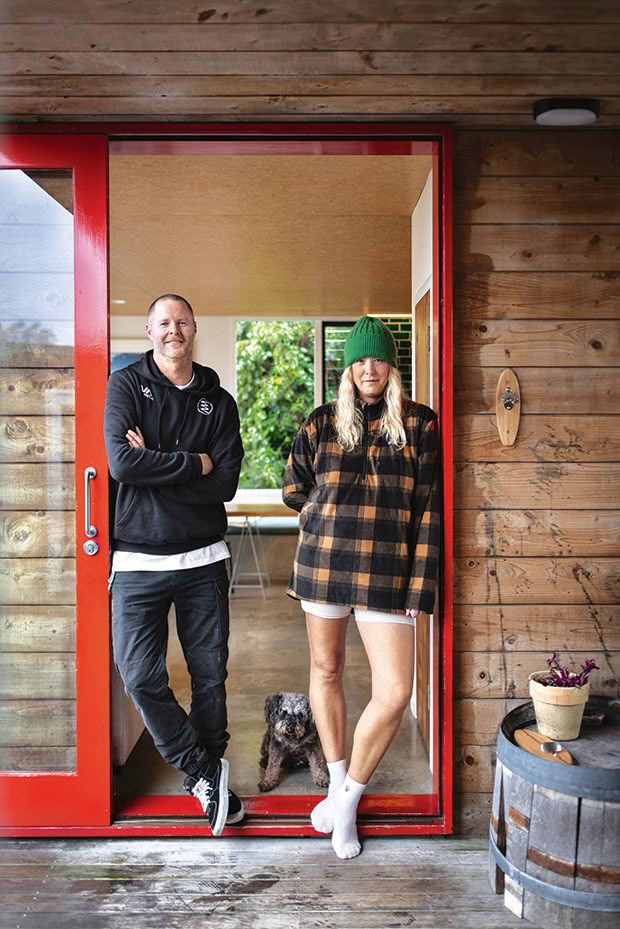
Dave Wood and Emma Shand’s Piha home was designed by builder Nat Jakich of Box and features lawson’s cypress cladding. During the recent floods, a tree blew over on the property, narrowly missing the back window. “We were up all night, listening to 170-kilometre winds. Combined with torrential rain, it was like having a water blaster on the house for eight hours,” says Dave.
Instead, he went through Europe to Morocco in an Escort Panelvan, discovered the highs and lows of South and Central America, and hiked across the Thar Desert in India — just him and a camel herder. One year, he found himself ensconced with a fellow nomad in an abandoned lighthouse that had been all but destroyed by the 2004 Boxing Day tsunami. “It took us a few days to convince a local Indian fisherman on Little Andaman Island to take us over on a tuk-tuk boat and drop us there with our supplies.”
Colourful, creative living is all very well in your 20s, but as his 30s loomed, Dave felt the pressure to return and “settle”. Where else would he live but the black-sand beach with its iconic giant rock that seems to anchor this tiny village to the land? A conversation with a fellow surfer set him on the path to becoming a paramedic. “It was the perfect timetable: four days on, four days off, so I could surf,” he says.
- In the front garden, a barrel-shaped sauna by Alpine Spas is used as part of recovery training. Dave calls swapping between the sauna and the ice bath “contrast therapy.”
- The view through the house looks over the Waitākere Ranges, down to Karekare; the white door on the right is the entrance to Dave’s home office. “Much of my business is working with clients online around New Zealand and abroad.” On the porch, a bench crafted by good mate Casey Drum, an intensive care paramedic, is made from macrocarpa sleepers.
As it happened, it was also a career that took up the thread of challenge that now ran through his veins. As paramedic intensive-care specialist, he saw it all —from high-speed car crashes to industrial trauma to mental health issues. Working with the very young to the very old in an environment that could change at the turn of a dime was stressful.
“When I felt my mind racing and my stomach churning, it took me straight back to when I was a kid facing those big waves. But here I had to remain cognitively focused on making sound clinical decisions.”
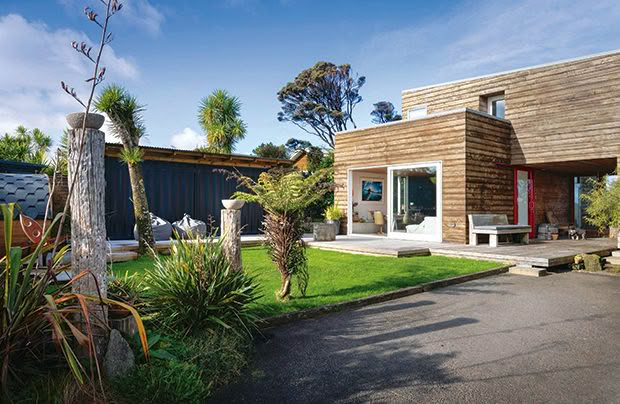
Dave feels fortunate to have found this everyday home-sweet-home in Piha. His grandparents grew up here, and his family all have baches in the vicinity.
There came a time when Dave felt the need to upskill. He wanted to understand his body’s stress response and develop practical skills to leverage that pressure. What he learnt gave him the mental preparedness to deal with the job; he chatted with work colleagues about it and wanted to pass it on to others. After 12 years of working night shifts, he was searching for the next adventure. He had used his newfound skills to guide him through an episode of chronic pain after failed bilateral hip surgery, so it was a natural progression to use his real-world experience to start his own business: a mind-body programme to get everyone (from Jack and Jill next door to top-name athletes) performing at their best.
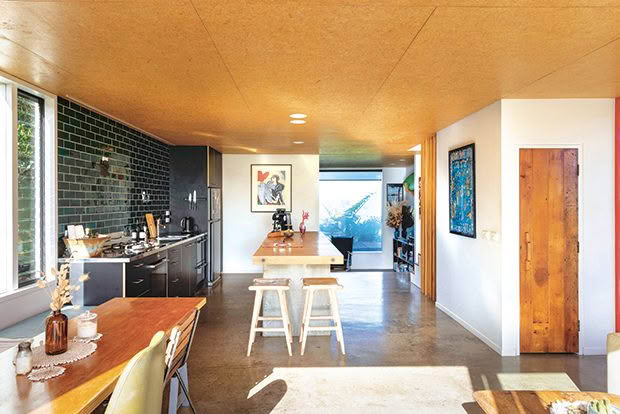
A rustic island bench made of American oak is a focal point in the kitchen. Down a couple of stairs from the kitchen, in the snug, a picture window frames the bush.
“The human body is an integration of 12 physical systems,” he explains. This interconnection cannot be severed or be fooled: one affects the others as surely as night follows day.
Working from home does not get better than this. Emma, who joined the business in a marketing capacity, and Dave can live in their paradise with very little need to venture further, and each day can guide clients to make meaningful, positive steps towards being the best they can be. Many are coached online, but others come to experience Calm Under Pressure workshops in a magnificent environment where pushing the physical limits is easy. Climbing up dunes, training on the glittering, long beach — it’s elemental. But then there is also meditation practice, gym sessions and classroom learning on topics such as sleep hygiene and breath work. “Our breathing is connected to every emotional state, so by taking conscious control of it, we can control how our body responds,” explains Dave.
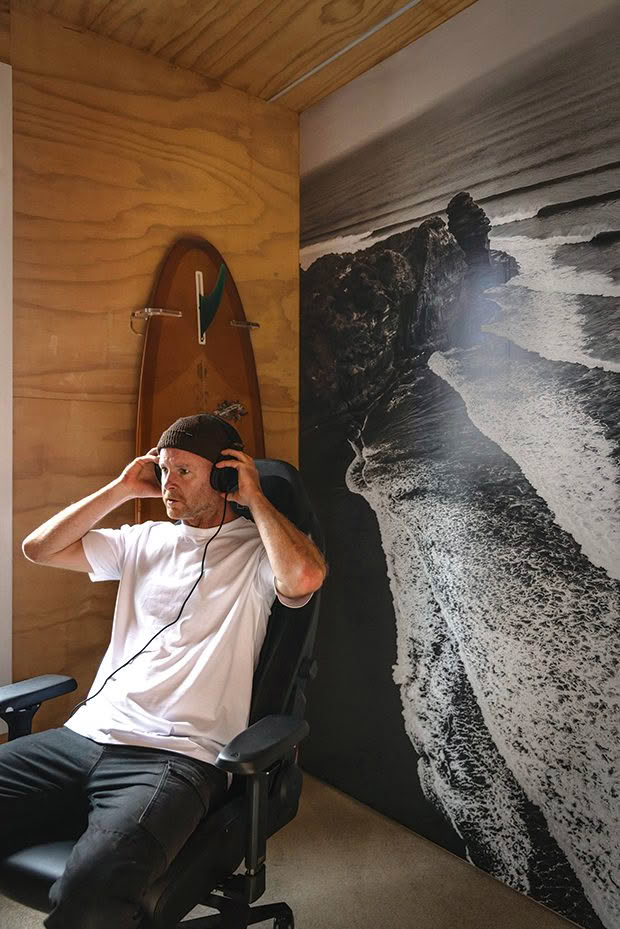
Dave records podcasts in his home office where a photograph by Craig Levers of Photo CPL was taken on one of the best day’s surfing Dave’s had.
In the house’s front garden, there’s the garage where, like all good Kiwi start-ups, Dave began the business. There’s also a sauna and an innocuous-looking bath. Perhaps for romantic nights looking up at the stars?
Um, no. It’s for ice (and not for beersies by the barbie). “Ice bathing teaches control. That one-degree stimulus is noxious,” says Dave. “By the end of the workshops, to be able to show clients they can control their mindset with this practical simulation — well, it’s extremely powerful.”
- A former neighbour made Dave’s surfboard — Hayden Chamberlain of HC Surfboards (now based in Ruakaka). “He’s one of New Zealand’s best surfboard shapers.”
- The view across Piha — Dave’s playground and outdoor office.
Nothing, though, can be as powerful as the place itself. “Piha is not just somewhere I live; I have a deep connection to it,” says Dave. “I’ve been all over the world, but I’ve never seen such a crazy melting pot of natural energy.” Out here, he has time to focus, complete autonomy — and every day is different. And when the big beach breaks roll in, he can simply grab his board and go.
THE POWER OF CALM
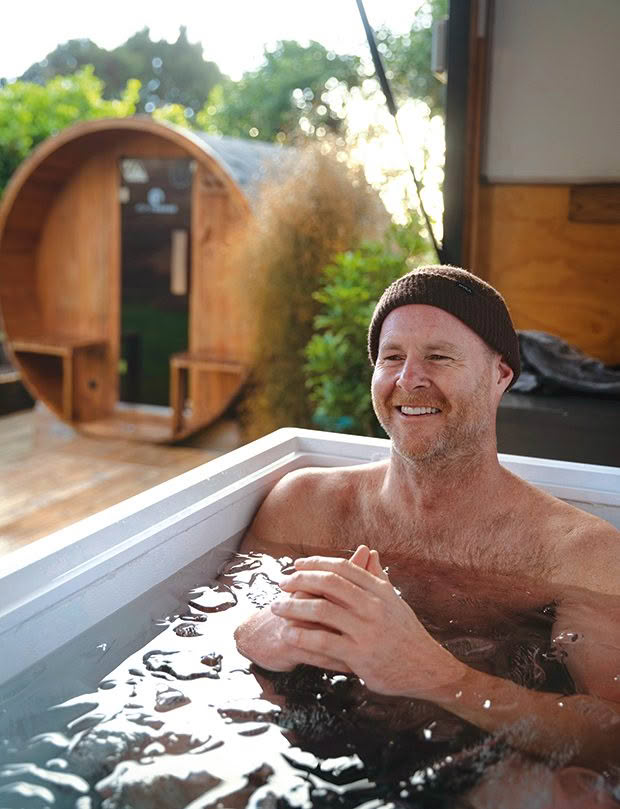
Dave’s top three tips for mitigating stress and being mentally prepared for life’s challenges.
◆ Reconnect with nature in a meaningful way. It activates the calming division of your autonomic nervous system, which creates balance and flushes the body of stress hormones. This is vital in a world where we often spend a lot of time in an upregulated physical and mental state. Take off your shoes and walk on the beach, go to the park or jump in the ocean. Put your feet on the Earth’s surface every… single… day.
- Professional boxer Joseph Parker powers the dunes.
- Dave runs Olympic surfers Billy Stairmand and Ella Williams through a stress mitigation, mental-skills development and breathing training programme at a pool overlooking North Piha.
- Brad Riddell (UFC lightweight MMA fighter) and Israel Adesanya (world champion UFC fighter) participate in a training day at Kitekite Falls.
◆ Challenge yourself. All the good things in life happen when you are willing to go toward the fear, uncertainty, apprehension, tension, discomfort and the unknown — seeking constant comfort might feel nice, but nothing good grows there. People tend to avoid certain challenges because they fear failure. But failure is part of success; it is where deep learning and reflection occur.
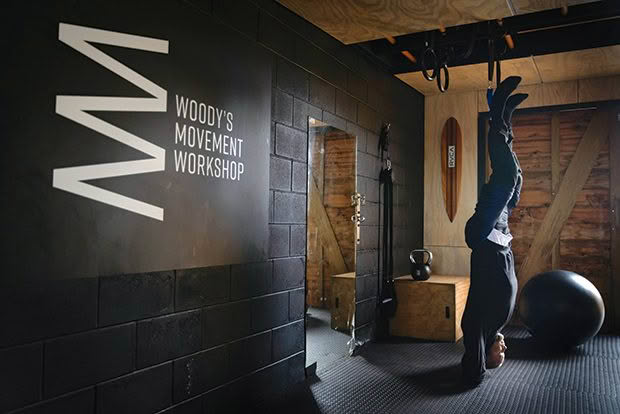
◆ Meditate. It improves your ability to focus. We’re so accustomed to filling any void with a phone, TV, or alcohol that it can feel agitating when we switch this off. Meditation doesn’t need to be done sitting down in a quiet place. Meditation is simply bringing your mind and attention onto what you are doing, allowing your mind to wander but bringing it back now and then. This activates the higher brain centres that unlock creativity, focus, attention and your ability to be alert, calm and in control. Many top performers, leaders and athletes worldwide share the common practice of mediation.
Love this story? Subscribe now!
 This article first appeared in NZ Life & Leisure Magazine.
This article first appeared in NZ Life & Leisure Magazine.
